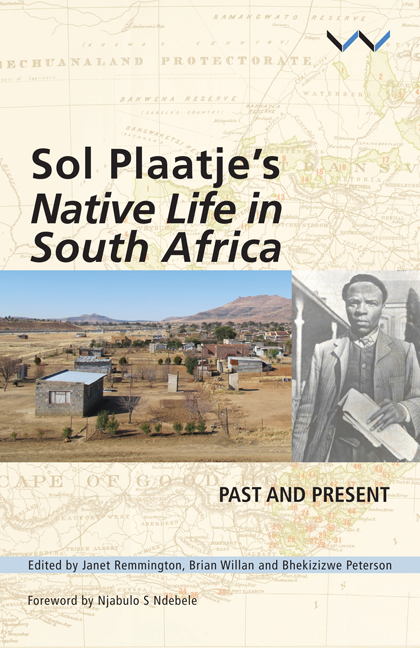Book contents
- Frontmatter
- Table of Contents
- Acknowledgements
- Foreword: Sol T Plaatje and the ‘power of all’
- Introduction: Native Life in South Africa – then and now
- Editions of Native Life in South Africa: 1916 to the present
- Looking Back: Foreword to Ravan Press edition of Native Life in South Africa, 1982
- Poetic Tributes
- What is in a name? In memory of Sol T Plaatje
- Segopoco Sa Moshui Sol T Plaatje
- In memory of the late Sol T Plaatje
- Lefatshe, nkometse
- Earth, swallow me
- Miscellaneous Frontmatter
- Chapter 1 Native Life in South Africa: Writing, publication, reception
- Chapter 2 Modernist at large: The aesthetics of Native Life in South Africa
- Chapter 3 The print world of the press and Native Life in South Africa
- Chapter 4 Going places: Native Life in South Africa and the politics of mobility
- Chapter 5 Native Life in South Africa and the world at war
- Chapter 6 African intellectual history, black cosmopolitanism and Native Life in South Africa
- Chapter 7 ‘Native Lives’ behind Native Life: Intellectual and political influences on the ANC and democratic South Africa
- Chapter 8 Whose past? Native Life in South Africa and historical writing
- Chapter 9 Women and society in Native Life in South Africa: Roles and ruptures
- Chapter 10 African progressivism, land and law: Re-reading Native Life in South Africa
- Chapter 11 Land and belonging: On the tomb ya ga Solomon Plaatje
- Chapter 12 Revisiting the landscapes of Native Life
- A Contemporary Reimagining: The Road to Dikhudung
- Contributors
- Plaatje Resources
- List of Figures
- Index
Chapter 10 - African progressivism, land and law: Re-reading Native Life in South Africa
from Poetic Tributes
Published online by Cambridge University Press: 21 April 2018
- Frontmatter
- Table of Contents
- Acknowledgements
- Foreword: Sol T Plaatje and the ‘power of all’
- Introduction: Native Life in South Africa – then and now
- Editions of Native Life in South Africa: 1916 to the present
- Looking Back: Foreword to Ravan Press edition of Native Life in South Africa, 1982
- Poetic Tributes
- What is in a name? In memory of Sol T Plaatje
- Segopoco Sa Moshui Sol T Plaatje
- In memory of the late Sol T Plaatje
- Lefatshe, nkometse
- Earth, swallow me
- Miscellaneous Frontmatter
- Chapter 1 Native Life in South Africa: Writing, publication, reception
- Chapter 2 Modernist at large: The aesthetics of Native Life in South Africa
- Chapter 3 The print world of the press and Native Life in South Africa
- Chapter 4 Going places: Native Life in South Africa and the politics of mobility
- Chapter 5 Native Life in South Africa and the world at war
- Chapter 6 African intellectual history, black cosmopolitanism and Native Life in South Africa
- Chapter 7 ‘Native Lives’ behind Native Life: Intellectual and political influences on the ANC and democratic South Africa
- Chapter 8 Whose past? Native Life in South Africa and historical writing
- Chapter 9 Women and society in Native Life in South Africa: Roles and ruptures
- Chapter 10 African progressivism, land and law: Re-reading Native Life in South Africa
- Chapter 11 Land and belonging: On the tomb ya ga Solomon Plaatje
- Chapter 12 Revisiting the landscapes of Native Life
- A Contemporary Reimagining: The Road to Dikhudung
- Contributors
- Plaatje Resources
- List of Figures
- Index
Summary
This chapter examines the long-term economic and political significance of the arguments that Plaatje presented a century ago in Native Life in South Africa. I have it in mind to unsettle two largely dismissive readings of his work that are influential today. The first of these comes often from our students, who view the mission-educated elite as liberal agents of imperialism, or as stooges of international capitalism. These criticisms are rarely based on a careful reading of Plaatje's book, but they are nonetheless powerful and pervasive, justifying the neglect of the oldest black South African writers and their arguments. The second emerges from the scholarship that has been produced in South Africa over the last quarter-century on the social history of the countryside. The assessment of Plaatje offered here is more careful, but it also suggests that the arguments in Native Life were neither representative of the desires of the majority of Africans on the land, nor – most importantly – of the actual conditions under which farming continued for much of the twentieth century.
In this chapter I want to draw out the global importance of the claims that Plaatje presented about the obligations and promises of African imperial progressivism. This is in part a matter of political significance, allowing Plaatje – like M K Gandhi – to assemble an international movement, based mostly in Britain and North America, against the forms of white supremacy that were developing in South Africa. In his own lifetime these efforts produced only bitter defeat but, arguably, it was the same movement that ultimately defeated the apartheid state. Plaatje's book is also an economic prediction about the consequences of stripping Africans of formal legal rights over land. Here I suggest that we can assess these claims – and the importance of their history – by comparing the linked but substantially different legal and economic developments that have taken place across the border, in Botswana. In both cases I show that we have good grounds to think again, and in new ways, about what was at stake in the writing of Native Life.
- Type
- Chapter
- Information
- Sol Plaatje's Native Life in South AfricaPast and Present, pp. 175 - 195Publisher: Wits University PressPrint publication year: 2016



